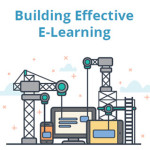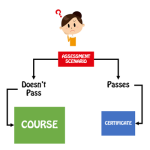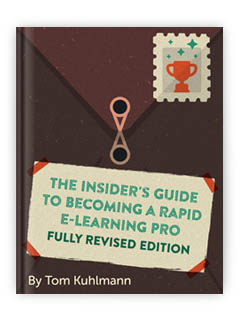this is excellent… As a recent hiring manager, it’s amazing how few applicants I’ve gotten with the relevant skills… Most applied to GAIN the skills I was looking for. Very important to do it on your own and build those key skills to make rapid eLearning happen… As usual, nice work Tom…
Get an E-Learning Job with these Simple Tips
October 18th, 2011
I’ve been on the road quite a bit this year. One of the most frequent questions I get is how to find an e-learning job. While the rest of the economy seems to be stuck in mud, this seems to be a good time to consider a career in e-learning. It’s still a relatively new industry and technology is making it easier than ever to get a foothold.
In a previous post I talked a bit on how to prepare for opportunities by getting experience and maintaining a portfolio.
- Here’s Why You Need an E-Learning Portfolio
- Do You Need An Instructional Design Degree?
- 5 Ways to Prepare & Be an E-Learning Winner
In this post, I’d like to expand that a bit. I’d also like to mention that these tips work if you’re looking for a new job or if you’re trying to position yourself in your current organization.
You’re competing against others for the same position.
This is true if your opportunities exist inside or outside your organization. Some people don’t like the notion of competition, but it’s real. Usually, the person with the most experience and best qualifications gets the job. While you can’t control the qualifications of others, you can control yours.
You’re not entitled to opportunity; you make it happen. That means that it’s up to you to get the experience and qualifications you need. Find out what you need to know and then proactively go out and get the experience so that you can compete for the job you want.
Get experience to build diverse skills.
Years ago, when I realized I wanted to be in the training industry, I did an assessment of my skills and figured out where I was lacking. Then I looked for ways to build the skills I didn’t have.

Look over job postings that interest you. Or talk to people in your organization about what you want to do and find out how you can get there. Make a three-column document. In one column list the job description and requirements. In the other, write a sentence that describes your experience. In the third, document proof of this.
If you don’t have the experience or proof to back it up, go out and get it. I’d also add that you want diverse experience to show different skills. There’s a difference between software training using screencasts and soft skills training that may be built around interactive scenarios.
Maintain a portfolio of your skills.
You don’t need a formal portfolio that’s always visible, but you should have a portfolio that documents the work you’ve done and the skills you have. For some of you, the work you do is confidential. In those cases, pull out key parts of the course that show off different skills and then remove all content that is proprietary. Replace it with generic content.
If you can’t show the actual product, do a simple screen grab, and then document what you did. I like a simple three-pronged approach:
- Project goals: what was the project about and what did it hope to accomplish
- What I did: explain what YOU did and why you did it
- The results: compare goals to results
No one wants to sit through a two-hour demo course and they don’t want to read a ten-page dissertation. Keep it short, simple, and focused.
Practice, practice, practice.
Unfortunately, many organizations might have you build one hundred courses, but they’ll all be the same course built a hundred times. In those cases, you don’t get to expand your skills. You’d be better off building ten courses that are different than a hundred that are all the same.
In those cases, it’s up to you to practice. Review other e-learning courses or multimedia. Then try to implement some ideas in little practice modules. You don’t need to build big courses, just mini modules. Clean them up a bit and they’ll make a great addition to your portfolio. Plus, they’ll give you skills to help make those hundred courses a bit different each time.
Connect with people in the industry.
There’s lots of power in the e-learning community of practice. Most people loiter and lurk. They collect information but they don’t really connect with others. That’s fine. No one expects you to sit on the couch, eating bonbons and surfing the community.
Only a handful in the community is actively engaged. Engaging in the community is a great way to meet people who can help you build skills. You can ask questions of experts and share what you’re doing. Odds are that as positions open, you’ll have an inside advantage (especially if you’ve shared things from your portfolio).
I became an MVP in the Articulate community because I was there helping people. As an MVP I got all sorts of opportunities for freelance work. Eventually my role as an MVP created the opportunity to join Articulate full time to do what I’m doing now.
You don’t want to game the system and just pester people about opportunities. But if you’re inclined to be involved and connected with others then odds are that you’ll develop your skills and find some opportunities.
Become an expert.
You don’t need to be a grizzled veteran of e-learning to be an expert. In this world of social media expertise is transient. I’d rather have someone with 5 years of experience share ten practical tips that I can use, than have to read some e-learning expert’s book who shares information I’m not sure how to apply.
Today it’s easier than ever to build your expertise. Here are a few ways to do so:
- Help others. Go to the e-learning community and make it your goal to answer three questions every day. It’s not a major time commitment. By the end of the year, you’ll have close to eight hundred posts. In no time at all, you’ll be seen as an authority and expert. You may even become an MVP.
- Document what you’re learning. Start a blog and use it to show what you’re learning. Combine that with your portfolio. Build a simple module and then explain what you did and some of the decisions you made.
- Create some simple tutorials. Do some screencast tutorials and show some production techniques. You may not have years of experience, but your five-minute tutorial is helping somebody with less experience and that makes you an expert to them.
Anything you can do to help others is going to help you improve your skills and build a network of peers. In addition, all that goodwill will come in handy when you start looking for opportunities.
Be a volunteer or intern.
A wonderful way to gain experience is by volunteering to build some e-learning courses. There are usually opportunities in your community with NGOs, churches, or other groups where you can practice your skills and help them with their training needs.
Here’s a bonus tip. A while back I tried to recruit some multimedia interns from a local technical college to help with the community. None of them saw the value of working with the community and helping build demos. The funny thing is that eventually I ended up hiring two full time community managers. That could have been them if they weren’t so short-sighted.
The point is that you never know what opportunities exist. Don’t be short-sighted.
Get educated and keep learning.
There’s some debate about the value of advanced degrees for e-learning. Without considering a specific degree, there’s value in an ongoing education. If you’re not in a formal program, at least continue your learning by following bloggers in the industry and reading books.
With that said when you do look for work, educational background is still one of those filters used by employers. The person with a degree is usually in a better position than the one without. So, make that investment if you can. If not, build a portfolio of really solid skills.
- Here’s a list of some good books collected in the community. If you have other recommendations, add them to the comments and I’ll update the list.
- There’s also a list of different educational programs that are available. They range from certification to Masters. If you’ve attended one of these programs, feel free to add a comment to share your experience for those interested.
There’s a lot of opportunity in the e-learning industry. Hopefully, these tips will help you out if you’re trying to break in. They also work without leaving your current organization. I know plenty of people who took upon themselves to build some simple training at their business and ended up becoming the training team.
If you’ve been building courses for a while, what tips would you offer to the person who wants to get into the e-learning industry?
Events
- Everyday. Check out the weekly training webinars to learn more about Rise, Storyline, and instructional design.
Free E-Learning Resources
 |
 |
 |
|
Want to learn more? Check out these articles and free resources in the community. |
Here’s a great job board for e-learning, instructional design, and training jobs |
Participate in the weekly e-learning challenges to sharpen your skills |
 |
 |
 |
|
Get your free PowerPoint templates and free graphics & stock images. |
Lots of cool e-learning examples to check out and find inspiration. |
Getting Started? This e-learning 101 series and the free e-books will help. |
29 responses to “Get an E-Learning Job with these Simple Tips”
[…] See more here: Get an E-Learning Job with these Simple Tips […]
Tom – as always, excellent advice. You’ve been talking about portfolios forever and, although I had always had a few things to show, I took your advice and put together a solid list to compliment my resume and show prospective employers and freelance opportunities. It has made a huge difference in being able to present myself professionally. The importance of creating those little mini-demos to show your range can’t be overstated – particularly if you aren’t able to show your actual work for proprietary reasons. The time invested in building a professional presence is well worth the rewards!
Thanks for sharing these tips…I really like the idea of mini-modules, it has inspired me to build some quick and simple courses to really hone in on my strenghs and weaknesses within e-Learing. Plus, the idea of creating simple mini-modules will help in two ways – with editing down my ideas and the obvious which is focusing on practicing my e-Learning skills vs. getting wrapped up in the potential complexity of a topic. Thanks again 🙂
These are great tips, and I’d agree that a portfolio is a must.
I’d add that if you’re applying for an instructional design position in which you’ll need to analyze the performance problem, propose the best solution, etc., your portfolio should include short descriptions of your design decisions, and not just snippets of the finished course.
When I’ve needed to hire IDs, the biggest weakness I’ve seen is the tendency to just submit samples of courses without any explanation of what the performance problem was, why the course was designed that way, and how it helped the organization.
Hi Tom,
Love your blogs – very informative and timely for a newbie E-learning trainer/developer like me! For one of your next topics, could you do a write up to explain the value of e-learning in today’s economic landscape? For example, how to make a business case or pitch to executives “why e-learning within our business?”
Looking forward to reading more of your write-ups!
Thank you for your tips. I don’t have a lot of experience but I love to study about e-learning and I have tried to apply all your advices.
Thank you for the tips! I’m just getting into the e-learning space and will keep them in mind.
Tom, your timing is perfect.
Just last week I got the message from my new manager that it is time for me to go and look for another job.
Our training department is going to change with this new manager, and so is the work our department is supposed to do.
Since none of the members of our department have had the proper education, and I’m the temp (for the past 3 years) they do not want to invest in developing my skills.
So now it’s time for me to go and look for that new opportunity, and the tips you give in this blog will help me take that opportunity.
Thank you for your tips
Hi Tom,
This was a very interesting read. I agree building small training courses by yourself, helps you in the long run. After all, its never good to be short-sighted. 🙂
As usual, great post! Tom every post you have has some pearls to take. 🙂
I agree with Tom; don’t wait for opportunity to knock, go looking for it! Even if it means doing voluntary work.
I don’t think I’ve ever known anyone who has landed their dream job on the first try. Usually, it’s after bouncing from here to there. Sometimes you realise that what you wanted do is not for you and something else works better for you.
Great blog and solid advice for eLearning. It is the simple stuff like you have mentioned that make the learning more memorable. @Anderson, you might review the salary your offering. Those with the skills you are looking for could be attracted.
Excellent tips, Tom!
I’m expanding my experience in e-learning and your post has motivated me to design some modules for my portfolio.
Thank you very much for sharing your experience!
Good evening.
This is my first visit in your blog.
These are very useful tips.
I come back to read more articles.
[…] Get an E-Learning Job with these Simple Tips […]
Thanks for the tips Tom! I have been job hunting every day, and I quickly realized I’d better be building samples. You have validated my plan. Plus you gave me new ideas for more samples out of my proprietary work! The link to volunteer is perfect too; I was just looking for that kind of thing last week. Yes, I’d love to see a workshop in Portland provided the timing/cost is right.
This post is really encouraging. At the moment, I’m an Educational Technology grad student. I’m getting the education now for e-learning, but in addition to interning & volunteering, what tips to you all have for just getting my foot in the door with e-learning?
As a graduate student pursing my M.A. in Training and Development at Roosevelt University, and also one seeking to gain more experience within the field of eLearning, I found this post extremely valuable. My program has a blog, http://rutraining.wordpress.com, that I have found valuable as well, but hearing from other experienced professionals is helpful as well.
I have had those times of not knowing where to start, wondering how I will get the experience, and seeking ways to get my foot in the door and this blog, this post especially, has given me some insight on how to tackle each of these areas. My program requires that we create a portfolio to graduate, so I feel confident that I am well on my way! Thanks for the tips, especially the assessment tool to identify where I am, where I want to be, and where the gaps lie.
This was a very helpful article. I am an eLearning Developer (with an Masters in Instructional Design) and am starting to look at what other skills I need to be marketable. My question is when putting together a portfolio with samples, is there a tool you would suggest for creating and publishing your samples. I know you can go the traditional website route but any sites where you can create, house, edit and publish a portfolio?
Tom,
Very often when we read tips or suggestions for getting a job in our chosen field or moving up the corporate ladder to the job that we aspire to, the main tip or suggestion is “dress the part for the job you want.” That is so passé. However, you, on the other hand, have shared extremely valuable information in this post. I speak as a former Career and Education Counselor of military spouses under a Department of Defense contract. The first point you made that I wish I could scream to the mountaintops is for people to stop acting like the world owes them a job in their chosen field and to stop burying their heads in the sand regarding competition. When spouses would contact me whining that they can’t understand why they can’t get a job, I had to tactfully suggest that he/she must be aware that, depending on the job being sought, there could be hundreds of people applying for the same job. The second excellent point that you made is that the first thing one should do is a skills self-assessment comparing where you are now skill-wise with where you need to be to get the job you want. As you said the next thing to do is to go about acquiring the skills and training that you need to get the job you want. In my last professional position, I would hear co-workers whine about never being chosen for projects and some became downright belligerent about not being tapped for projects. However, many of the people who were selected for special projects had taken the time to avail themselves of the free Skills Soft training provided on the company’s HR website!
Another great idea that you shared is the creation of a portfolio. Very often in any job – training, instructional design or otherwise, many people leave an organization without taking with them proof of the work they’ve done. Yes, some of it confidential or considered company property, etc. but much of it is not. One word of caution regarding your portfolio: if you use it while trying to acquire a new position, never give the only copy of your portfolio or product to the prospective employer. A friend did this and nearly 25 years of work with a major South Florida power company was lost because the prospective employer “lost” her work and she wasn’t even hired for the position.
One suggestion I have for people who want to connect with people in the Instructional Design field is to subscribe to the Society of Applied Learning Technology (S.A.L.T.) newsletter. Even though I am currently studying to become and Instructional Designer, I subscribed to this newsletter the moment I decided to pursue a graduate degree in the field and this subscription has served 2 purposes. First, the job listings keep me motivated to continue to earn the degree because I see there are a plethora of jobs in the field and second, by viewing the jobs and other information, I know what skills I need to be learning. The S.A.L.T. URL is: http://www.salt.org.
Your suggestion to become an expert is an excellent one. Just as entrepreneurs are encouraged to focus on a target or niche market, the same is true in any field – become an expert at something. I have a friend who isn’t just a pediatric nurse; he specializes in inserting intravenous tubes in premature infants. I have another friend who is a pharmacist but she’s a mental health pharmacist, specializing in the study of what drugs work best for which mental disorder.
Finally, thanks for reminding us to serve others and by doing so, we are not only contributing positively to mankind but we may be creating an opportunity for ourselves.
“You’re not entitled to opportunity, you make it happen.”
This makes no sense. If you have the ability to make opportunity happen, then that means you already have the opportunity.
Tom,
I was searching on the net for career options as ID when I bumped upon to this post. I used to read this blog a lot when I was working with Rapid Elearning. I know it’s an old post, still I’m posting here few questions, hoping that they get answered:
Just a brief background – Have 10 years of experience in new media as graphic designer, project lead and a bit of ID.
I’ve now decided to move into ID field completely and started doing a PG diploma in ID as I got stuck as a designer here in India. The jobs are mostly for IDs. Nevermind, ID as a subject is also of interest to me.
Now:
1. Does this shift in career after 10 years make sense?
2. What are the career options that a profile like mine can get from the eLearning domain other than just creating(ID) the course?
It would be of great help for me if I get some observations from you.
Thanks,
Tirtho









0
comments